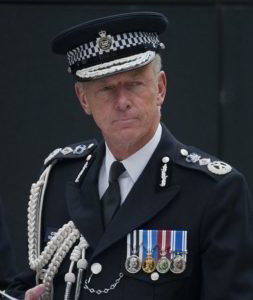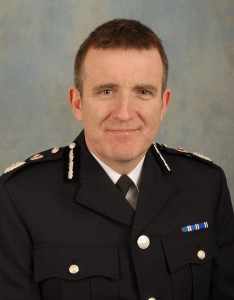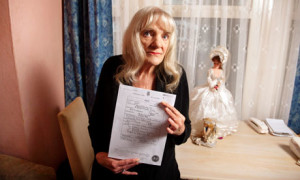Hogan-Howe: A Legacy of Cover-Ups

Bernard Hogan-Howe
Bernard Hogan-Howe is to resign as Commissioner of the Metropolitan Police. Among the numerous dubious areas of his career (see the Undercover Research Group’s profile for more), he cultivated the Met’s cover-up and obstruction in the spycops scandal.
When Mark Kennedy was exposed in 2010, Hogan-Howe was working for HM Inspectorate of Constabulary (HMIC). As we detailed last week, he drafted their report into the scandal, which was pulped just hours before publication because new revelations proved it was untrue.
Even the second version, completed by Denis O’ Connor, was essentially a whitewash that blamed Mark Kennedy and absolved management.
By the time that report came out, Hogan-Howe was Commissioner of the Met. He set up Operation Herne, the Met’s self-investigation into spycops, appointing Pat Gallan as its head.
MARKING THEIR OWN HOMEWORK
In February 2013 Gallan testified at a Home Affairs Select Committee hearing on spycops. Repeatedly pushed on the fact that officers stole the identities of dead children, she refused to apologise for the practice (or anything else). She said there had only been one instance that she knew of until the Guardian had exposed another the day before the hearing. In actual fact, the practice was mandatory for Special Demonstration Squad officers from the 1970s to the 1990s.
Gallan’s performance was so outrageous that she was rapidly removed from her post. In an attempt to make Operation Herne appear more independent, her replacement was Mick Creedon, a senior officer from outside the Met but who, in all probability, personally authorised some of Mark Kennedy’s deployments.
The Home Affairs Select Committee’s report insisted the Met inform parents whose dead children’s identities had been stolen by spycops. Hogan-Howe – personally and publicly – refused.
Although revealing the names used would only expose an officer’s fake identity, not the real one, Hogan-Howe said it was much too dangerous because activists targeted by the Special Demonstration Squad included
‘criminals behind bars and at large today who would have no qualms in doing serious harm’
This echoes the phrasing in the HMIC report he drafted, firmly asserting that the protesters Mark Kennedy infiltrated
‘were not individuals engaging in peaceful protest, or even people who were found to be guilty of lesser public order offences. They were individuals intent on perpetrating acts of a serious and violent nature against citizens going about their everyday lives.’
ABUSING THE ABUSED
Hogan-Howe was already Met Commissioner when legal action was launched in 2011 by eight women deceived into relationships with undercover officers. The Met’s lawyers threw every obstruction they could at their victims. They tried to have the case struck out. When that failed, they said the Met was not responsible as such relationships were not authorised. When the women pointed out this meant the case could be heard in open court instead of a secret tribunal, those same lawyers said that the relationships were, after all, authorised.
The Met then claimed the relationships were based on ‘mutual attraction and genuine personal feelings’. Throughout all this, they tried to avoid giving any information, saying they would ‘neither confirm nor deny’ (NCND) that any officer was in fact an officer, and further lied saying NCND was a ‘long-standing policy’ when it was merely a recent and erratically applied tactic. They would take this as far as referring to Mark Kennedy by code letters.
Eventually, they were forced to concede Kennedy was a police officer and, three years into the case, they were ordered by a court to admit Bob Lambert and Jim Boyling were too. To this day, they block accountability with NCND for all other officers, even those like Mark Jenner who’s been exposed for years and confirmed by a colleague, and John Dines who has even admitted he was an officer and apologised.
After putting their traumatised victims through four gruelling years of these legal obstructions, late last year the Met finally settled seven cases in order to avoid having to go to court and disclose information. As part of the settlement the women negotiated a powerfully worded admission and apology.
How sincere was that apology? The Met are still forcing others with identical cases – in some cases with the same officers as the settled cases – to battle on in court.
In June, people deceived into intimate relationships with undercover officer Marco Jacobs were back in court. One of them, Tom Fowler, said:
‘By dragging their heels the police have increased the psychological damage they’ve inflicted on people, made it a lot worse. It just shows that the public statements made by Bernard Hogan-Howe and other police officers… are totally at odds with what they are directing their lawyers to do in court. It shows they can’t really be believed on any of these matters.’
WHEN IS A PUBLIC INQUIRY NOT A PUBLIC INQUIRY?
Earlier this year Met lawyers formally submitted that, at the forthcoming public inquiry, police should not give evidence in public. They alleged that the operations of the political secret police were too dangerous to be revealed, they claimed that being identified might lead to ’emotional unhappiness’ of the officers. By trying to have as much of the public inquiry held in secret, they were attempting to cover up rather than come clean.
This is the true face of Bernard Hogan-Howe’s Metropolitan police. Just as at Hillsborough, it uses the language of concern as part of an armoury to deny truth and justice to its victims and the wider public.
AS AT HILLSBOROUGH, SO EVERYWHERE
Hogan-Howe was personally present at Hillsborough in a role that has been criticised by the families. Hogan-Howe claimed he gave a statement to the 1989 Taylor Inquiry into Hillsborough and claimed to be one of the resolute champions of integrity who refused to change their statement despite being asked by another officer to do so. In real life, Bernard Hogan-Howe never made a statement to Taylor.
The Hillsborough families’ struggle mirrors that of so many bereaved people abused by police for wanting justice. Not only were they smeared, they were also the targets of spycops. Astonishingly, the Hillsborough families have been denied ‘core participant’ status at the forthcoming public inquiry.
As is established beyond all doubt, the fault at Hillsborough rested squarely with the police. This was the conclusion of the 1990 Taylor report, as well this year’s inquests who ruled that the 96 people were unlawfully killed by police action. Yet even after all this time and the damning conclusions of multiple investigations, Hogan-Howe cannot fully admit what happened.
‘A lot of officers did their best [at Hillsborough] in very difficult circumstances, but the leadership was sadly challenged’
They were not ‘sadly challenged’, they were irresponsible, reckless liars who unlawfully killed 96 people. His instinct to defend officers – especially senior officers, especially himself – overrides any need to acknowledge the plain truth, let alone facilitate justice.
Earlier this year Hogan-Howe said a cover-up like the one that followed the Hillsborough disaster couldn’t happen these days.
‘It’s about making sure we are open and transparent… You’ve got more accountability than you’ve had for 20-30 years. I don’t think we would see today that sort of cover-up in the way we have in the past.’
There are many police cover-ups still happening today, with huge resources devoted to preventing the truth being examined. Moreover, in the case of the spycops scandal, Hogan-Howe has been the one directing it.
His protection of spycops means that most victims still have no clue as to the reason for their abuse. We have information on barely 10% of the officers, and the work has been done by victims themselves in the face of obstruction orchestrated at public expense by Hogan-Howe, whether at the pseudo-independent HMIC or as Commissioner of the Met.
It would have been more convincing if, before he reassured us, Hogan-Howe started by actually condemning the police action at Hillsborough for once and then stopped actively running the spycops cover-up. But that would have necessitated a break with his whole approach to police abuse of citizens, and the culture of the Met itself.


